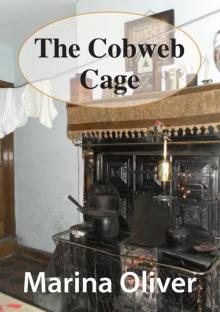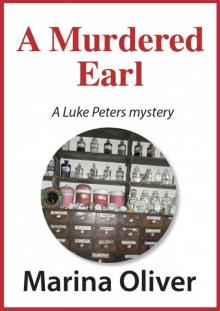- Home
- Marina Oliver
Convict Queen Page 18
Convict Queen Read online
Page 18
Grasping her robe she ran downstairs. Sal was huddled just outside the door to the kitchen, and inside it Molly saw flames. Grace was coming downstairs, dressed in an old threadbare robe and with her hair tied up in strips of rag.
'Go and fetch the neighbours,' Molly ordered, 'and all the apprentices. They can get the buckets of water Thomas keeps near the furnace, and brooms to beat out the fire.'
For a few moments she thought Grace would refuse, but there was a sudden whoosh from inside the kitchen and the woman backed away, then turned to run towards the workshop.
They put out the fire, but Molly could not discover what had caused it. Sal was a shivering wreck, weeping and crying it had not been her fault. John Shenlake, with a nasty glance at Molly, gathered Sal into his arms and soothed her as though she were a frightened horse.
The damage was not extensive, and Molly set Grace and Sal to cleaning up the mess in the kitchen, while she took down the curtains that smelled of smoke and aired them to get rid of all traces. By the time Thomas returned, the house would be as normal again.
*
Thomas determined to go to Shrewsbury. From there, he discovered, on consulting a map, he could get to Bristol and so back home.
He found one of the prison warders, and with the aid of a few judicious bribes, learned that yes, some years ago, there had been a woman called Molly Morgan, charged with theft and sentenced to fourteen years' transportation. She'd been pretty, spoke up at the trial, and they remembered her. The warder could not, and the Court officials would not, permit him to consult the records, but from their description of Molly he knew it was his wife. Molly Morgan had been married to a William Morgan, who had escaped capture. She'd lived, they thought, to the south, but they didn't know exactly where, and Morgan was a common name in the Marches, being as it were Welsh. He regretted not insisting that young Mary tell him where she had lived before Molly took her to London.
There was no more he could do. Even if he went to ask questions in all the villages, and there were far too many, would anyone admit to having a sister or daughter who had been transported to the far side of the world?
Yet she was here in England, ten years later. How had she managed that? Thomas supposed that anyone transported for what he learned was the more normal period of seven years could have returned.
He could not resolve these puzzles, and returned to Plymouth to discover there had been a fire in his house.
'From what Grace said, yer missus started it,' Shenlake said. 'Dropped some 'ot cinders onter some rags, I think.'
When he challenged Molly she laughed, said she had more sense, and it had been Sal who had started the fire.
'I don't believe you, Molly Morgan!' Thomas said. 'How did yer get back to England?
*
CHAPTER 12
Molly vehemently denied all knowledge of Shropshire, New South Wales, and convicts. She insisted the Sam who had sent the letter was no more than a neighbour.
'As you have been spying on me, did you go to Herefordshire and ask him?' she demanded.
'How could I, when I don't know where he lives?'
'Well, do yer mean to go back, doing more spying? Just on the word of a jealous old crone?'
She silently prayed he would not, for she dared not mention any village in Herefordshire where he would soon discover she'd been lying.
To her relief Thomas shrugged, said he had better things to do looking after his business, than traipsing all over the country after a lying bitch. He knew what he believed, and that was that.
'So you'd rather believe Grace's malicious gossip than your wedded wife!'
'I know she's truthful!'
The arguments continued. When Thomas complained his profits were going down Molly suggested he was not charging enough. This caused him to explode with fury.
'What in hell's name do you know about it?' he yelled at her. 'I've been in business for years, and all you know about is sewing slops for sailors!'
Molly turned away. If he didn't want her suggestions, he could go on losing his profit. Soon there would be none. As if he recognised the truth of this he reduced the small sum he had previously given her for personal expenses, saying that if she were worried she could manage on less.
She and Grace never spoke. If Grace wanted something she sent Sal to deliver a message, and when Molly went to the kitchen to talk to her she turned her back and ignored her supposed mistress. Molly was forced to send her orders through Sal. Thomas refused to listen to Molly's complaints.
It could not go on. The only advantage was that Grace was unable to spy on her since she only ever came out of the kitchen when she was serving Thomas his dinner. Molly packed a trunk with most of her clothes and sent it to the receiving office, where she booked a seat on the stage for two days later. That was when Thomas paid his workmen, and he kept the money in a drawer of his desk. Early that morning she slid out of bed and dressed, then silently gathered up the last of her possessions into a bundle. She put the money from his desk in a purse tied around her waist beneath her gown, and left the house. Soon she was on her way to London.
*
'I can't stay here.'
'No, I suppose if yer did and Mr Mare came after you, he'd ask the folks yer used ter work for,' Hannah said.
'And if they knew I'd left him, they wouldn't employ me.' Molly sighed. 'He came here, didn't he?'
'Aye, and he went ter see your Mary. I'm ever so sorry, luv. I'd not have told him where she was if I'd thought it would get ye inter trouble.'
'She didn't tell him anything.' Molly was quick to defend her daughter. 'He mistook me for someone else, and started accusing me of being a convict, of all silly things. And Grace was always jealous of me.'
'Grace?'
Molly explained. 'She'd been his housekeeper for years, and resented me.'
Hannah laughed. 'Was she hopin' ter wed 'im herself?'
'No, I don't think so. If she did, she was dafter than I thought. She was years older.'
'Just dain't want yer in 'er kitchen?'
'Yes. She never did what I told her, and Thomas supported her.' Molly laughed. 'It was funny, but I didn't laugh at the time. There was this lass, Sal, who was daft, and I sent all my orders by her, as Grace would never speak to me, nor listen to what I said.'
'The daft bitch!'
'I wonder if she got the messages muddled sometime? But that's all finished.'
'Will 'e come after you?'
'I don't think he wants me back, we were arguing so much. And perhaps he can't afford to, his business was losing, but he wouldn't up his prices like I said. If I'd been in charge things would have been better.'
'All the same, I think you'll 'ave ter go somewhere else.'
'Do you know anywhere?'
Hannah thought, and shook her head. 'I'll ask around, find summat nice for ye. But stay 'ere for a few days.'
It was two days later when Hannah said she knew of somewhere. 'Surrey side, it is. Better there, where no one that knows yer will see yer.'
Molly nodded. She wanted to get away from the memories here. She had considered leaving London and going to some big city like Norwich, but it seemed like too much effort, and Thomas wouldn't find her south of the river.
*
In Plymouth Thomas was considering whether to pursue Molly for the theft of his money.
'Why did she need to go?' he asked, maudlin when he realised she had left him, and at the same time furious she had taken his money.
'She were complaining you cut her allowance,' Grace said.
'She dain't like it when you accused 'er of tryin' ter set fire to the 'ouse,' John Shenlake said.
'Is she still in Plymouth?'
No one could tell him. No one had seen her, but he discovered she had bought several lengths of expensive materials from one of the shops she used, and put the cost on his account. That gave him furiously to think. Would she continue to use these accounts? Well, that was something he could stop at once. The Exet
er Flying Post had many notices similar to the one he wanted, and soon he could read his own. That should stop Molly using his name for credit.
'Look,' he said to one of the shops where he had an account. 'Here it is. I'll read it to you. "Whereas Thomas Mare, White-smith of the borough of Plymouth, in the county of Devon, and Mary Mare, his wife, are parted by mutual consent, this to inform the public in general, that he will not pay any debts she may contract after this public notice. Plymouth, 4th April 1800." That should do it.'
'Aye, it should.'
'Not that we did part by mutual consent,' Thomas said. 'I never knew what she was doing till I found the wages money gone. But it sounds better that way, don't you think?'
'Aye, it do.'
'I didn't want folks to know I'd bin robbed, and by my own wife!'
'So yer wouldn't tek 'er back?'
Thomas thought for a moment, then shook his head. 'It was a mistake to get wed, and someone I hardly knew. I won't do it again.'
'Can't, if she's still yer wife. Unless 'er dies. 'Can yer find out if 'er does?'
'I don't want ter know! It's finished, and never again!'
*
Molly soon settled down. The new lodging house was close to St George's Fields, a big open space used in daytime for soldiers, and on Sundays as a pleasure ground for Londoners coming from both banks of the Thames. From the north they crossed the new bridge, and Hannah, who sometimes came to visit Molly, said that after the tolls were abolished, more people crossed the bridge.
'Did Thomas ever come asking?'
'No, an' Mrs Mears says 'e's not been there either.'
'So he's forgot me. Good. It was a mistake to be wed. I'm far better off on my own, with nobody else to bother about.'
It wasn't difficult to find work. There were some large houses where people who wanted to escape from the noise and smoke of the north bank of the river lived, and they were pleased to find a skilled seamstress who was quick and efficient, even if she did charge slightly more than others.
'You're worth the extra pence,' she was told, and Molly just smiled and thanked them. If Thomas had taken her advice she'd probably still have been in Plymouth. On the whole she was pleased to have left, and her only regret was to be living once more in one room in a lodging house, rather than having a big house of her own.
She wrote to Sam to tell him where she was, and he occasionally wrote back to her. It was two years after she left Thomas that Sam wrote to say James had run away to join the Royal Marines. He'd be about seventeen now, Molly thought. How time flew. She wished he'd been to see her first, but he probably thought she'd try to stop him. He'd perhaps come to see her when he had leave. He knew where she was living.
*
For some time Molly had been intending to visit her daughter, but it was a long way, and she kept putting it off. Then one Sunday Hannah came to tell her Mary had left the house in Duncan Terrace and no one knew where she had gone.
'Gone? And no one knows where?'
'She probably taken up with a man,' Hannah said. 'How old is she? Twenty? It's surprisin' she dain't go off before now.'
'Are they angry with her? Her employers, I mean?'
'Disappointed, more. They said she were a good little cook.'
'Could she have gone to another job? Not wanted to tell them?'
'Mebee. Their old cook wasn't ready ter let go, they said, so Mary might 'ave been frettin', wantin' to be top cook, not under-cook.'
Molly worried, but hoped Mary would contact her, either to say she was married or had a new job. Or she would not, if she had simply run off with a man. If this were so, it was likely he would soon abandon her, and then she had only her mother to turn to. Molly decided that if Mary did come to her, and was without a job, she would send her back to Shropshire. The girl had never wanted to leave, but now she had some experience she might be able to find a job as a cook in Ludlow or Shrewsbury.
Before any of that could happen, though, Molly herself was in dire trouble.
*
'They belongs to me!'
Mr Bullock, J.P., pursed his lips. 'Can you prove it, Madam?'
'Well, I know they're mine, and so do some of me neighbours. I lives in Valentine's Row, an' they all know me there.'
'Yes, so you have testified,' the other magistrate Mr Smith said, and sighed.
Mr Bullock picked up the disputed shift petticoat and looked at it.
'How can you be so sure it's yours?' he asked.
Elizabeth Jones thought for a few minutes, then smiled.
'If ye look at the 'em, at bottom, the thread's a different colour in one place. There weren't enough ter finish it, see, an' I told Mrs Mears, that's what she calls 'erself, that 'er could use summat else rather than buy more.'
The two magistrates looked at the crumpled garment, fastidiously turning the hem around until they nodded.
'Yes, some of the thread is a different shade.'
'Mrs Mears works for you?'
'She sews fer me, sometimes. I'm a widow, an' I 'ave ter work to keep meself, so I sometimes ask 'er to do summat fer me.'
'But why are you accusing her of theft?'
Widow Jones looked impatient. 'The things were found with 'er last Sunday. Two days back. Well, the shift and napkin were.'
'Could she not have been sewing them?'
'Why?'
Mr Bullock frowned. 'She says she had some more thread of the right shade and was replacing the wrong coloured thread. But I see it has not been done.'
'Because she never meant to! She were thievin' it, like I said. And the napkin, 'er 'ad that too.'
'She says it was caught up in the shift when your girl gave it to her.'
'It never! An' there was a handkerchief, too. Where's that?'
'We will send a constable to look for it.'
Mrs Jones had to be satisfied.
She was back in court later when Henry Smith, the constable, stated he had found the missing handkerchief.
'It were in a drawer at the accused's 'ouse,' he said.
'There, ye see! I told you she took it.'
'Mary Mears, you are hereby committed for trial at Kingston on Thames Quarter Sessions,' Mr Bullock said. 'That's next month, I believe.'
'Aye, October. Be thankful you have such a short time to wait,' Mr Smith added, looking at Molly, who had remained silent all this time.
Elizabeth gave her a triumphant glance.
'Can I 'ave me property back now?' she asked.
'It has to be held as evidence.'
'Then I 'opes yer get sent ter gaol fer years,' she said, glaring at Molly.
*
The Surrey gaol was better than that at Shrewsbury, but not by much. Molly was thankful she had to spend only a couple of weeks in it. She'd considered Elizabeth Jones a good employer, even if they were not exactly friends. What she'd told the magistrates had been true, but she couldn't imagine how the handkerchief had come to be found in her room. Had Elizabeth, knowing that Molly's defence was the right one, tried to make certain she'd be convicted? But why?
One of the other women in the gaol knew Elizabeth, and her suggestion made sense.
'She allus were a jealous 'un,' she explained. 'Did she see you wi' that fellow George Mears, one Sunday, in the Fields?'
'She might have. But why not?'
Molly suppressed a grim smile. Mr Mears, a labourer, had been making his interest in her known for several weeks now. He wanted her to marry him, but Molly had had enough of marriages. She must still legally be married to William, if he was still alive, or Thomas, if William had conveniently died. She knew her second marriage had been bigamous if William were still alive, but Thomas certainly was. Another marriage would simply confuse matters even more. She could not explain this to George, however, and had been puzzled to find herself described as his wife in the court records. As it was Elizabeth who had laid information against her, had she been trying to make mischief?
Her fellow prisoner went on. 'Madam Jones
has been settin' 'er cap at George Mears this past year. 'E's an 'andsome chap, and she probably thought 'e were goin' ter marry 'er, till 'e set eyes on you.'
Molly, now aged forty-one, felt she ought to be gratified, but if her looks had brought her to prison, she wished she was cross-eyed and lame.
She was bitterly angry when she discovered her case had been transferred to Newington, a week after the Kingston Sessions. Yet another week before she could protest her innocence. Would they believe her? She could not prove that she had not meant to steal the shift and napkin, and had no idea how the handkerchief had got into her drawer. This time, however, she would pretend to be meek and bemused, not shout out her innocence as she had at Shrewsbury, which had probably caused the judge there to give her fourteen years. How long ago was it now? Fifteen years, she reckoned. If William had not stolen that hemp, would they still be living at Cold Weston? Or if she'd stayed in New South Wales, she'd have finished her time by now. Could she have got back then if she had done?
Somehow she managed to suppress her desire to deny what Elizabeth Jones stated. That she was described as the wife of George Mears, while untrue, might be an advantage if they searched other records and discovered she was Molly Morgan, an escaped convict.
She was devastated but silent when the Judge sentenced her to seven years' transportation. Her return to England, and she'd known safety here, had always depended on her not being recognised. It was wretched luck that once again, falsely accused of theft, she would be going back to New South Wales.
*
This time Molly was taken to Portsmouth to board the Experiment. Ten days later more women arrived. Most of them had brought clothes, and they were allowed on deck to parade in their finest for the benefit of the sailors. Molly did not care. After all her efforts she was on the way back. At times, when her misery lessened, she wondered what changes there had been in the nine or so years since she had escaped.
At least conditions on this ship were far better than on the Neptune. The vast majority of the convicts were women, though there were some free settlers, families for the most part, travelling on her. Captain Francis Withers was a far more humane man than Donald Traill had been. The food was adequate, they were allowed to exercise, and Molly settled down. On this voyage she would not have to contrive or sell her body in order to stay alive. Traill had been caught and prosecuted ten years earlier, but acquitted, Molly had heard. She wished she had been able to give evidence against him.

 Rebel Heart
Rebel Heart Theft of Love
Theft of Love Courtesan of the Saints
Courtesan of the Saints Fatal Slip
Fatal Slip Highwayman's Hazard
Highwayman's Hazard The Cobweb Cage
The Cobweb Cage The Irish Bride
The Irish Bride Apple Blossom Bride
Apple Blossom Bride Scandal at the Dower House
Scandal at the Dower House Eugenie and the Earl
Eugenie and the Earl Her Captive Cavalier
Her Captive Cavalier The Glowing Hours
The Glowing Hours Sibylla and the Privateer
Sibylla and the Privateer The Baron's Bride
The Baron's Bride Player's Wench
Player's Wench Gavotte
Gavotte The Chaperone Bride
The Chaperone Bride A Murdered Earl
A Murdered Earl Charms of a Witch
Charms of a Witch Convict Queen
Convict Queen The Accidental Marriage
The Accidental Marriage